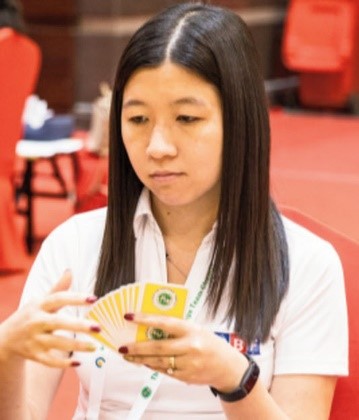We return to the first Alt Swiss IMP Teams-Pairs with four matches played in the 13-round Swiss event. A reminder of the format, which is effectively IMP Pairs, where results in head-to-head matches are compared to a datum result, calculated by dropping the top and bottom scores and averaging the remaining results on the board. The main difference is that each ‘pair’ consists of a team of between two and ten players, with any two playing in each match. After four matches, the 22-team field was led by:
| DONNER | 56.35 VPs |
| SEAMON-MOLSON | 50.47 |
| REYNOLDS | 50.22 |
| SELIGMAN | 50.05 |
| FREDIN-GOTTLIEB | 49.59 |
| FLEISCHMANN-TOKAY | 47.35 |
As usual, we start with some problems for you to consider. We will find out later how your choices would have worked out. First, with both sides vulnerable, you hold this hand in the South seat:
What action do you take?
Secondly, with just the opponents vulnerable, you hold as East:
What action, if any, do you take?
Finally, with just your both side vulnerable you are East with these cards:

You are not playing non-leaping Michaels, so partner’s Four Club overcall is natural. What, if anything, do you bid?
While you consider those problems, we begin with some spectacular card play from Round 5. So often, major swings are generated by what happens in the auction. On this deal, though, Swedish star Sandra Rimstedt missed an incredibly difficult defensive chance, allowing Poland’s Marcin Lesniewski to display some wonderful skills as declarer.
Rimstedt started by cashing her two high clubs, and I doubt that many experts would even consider the only legitimate winning defence from here, which is to continue clubs. (Declarer wins with the ♣ 7 as South discards a diamond and, upon regaining the lead with the ♦ A, North then has to play a fourth club, on which South can pitch his last diamond.)
Understandably, Rimstead cashed her ♦ A at trick three, and continued with a second diamond. Lesniewski, who first became a World champion with victory in the Transnational Teams at the 1997 World Championships in Tunisia, demonstrated that none of his skills as a card player have diminished with age. Winning the diamond in dummy with the king (unblocking the ten from his hand), he cashed the ♠K and continued with a second trump to the jack. Then came the ♦ J, overtaken with the queen, and the ♣ J.
South could not afford to ruff, so he pitched a heart and Lesniewski disposed of the last diamond from his hand. Again, South could not ruff when the ♦ 9 was led from dummy, so everyone threw a heart. Lesniewski now ruffed dummy’s last club and returned to dummy at trick 11 with the ♥ A. South’s remaining ♠Q-9 were thus gobbled up by declarer’s ♠A-10 in a trump coup at the end. A magnificent E/W +620 and 12 IMPs to SELIGMAN, who won the match 20-6 and, in so doing, replaced their opponents at the top of the leaderboard.
Two other declarers in the event also played in 4♠ (one of them doubled) and the first four tricks were the same. One went two down for -200, the other three down for -800.
Our hand from Round 6 features the first of this week’s bidding problems, and proved remarkably difficult even for a field packed with world class players.
What a fantastic game we play, and how quickly one can go from hero to zero:
This problem is trickier than it might at first appear, as a 2♣ cue-bid presumably shows both majors and 2NT is not unusual, but natural, in this position. So, what are the options for South when the 1♣ opening is passed to him? 4NT showing red suits? A takeout double, perhaps, but that is always risky with a singleton spade? Some number of diamonds?
Marcin Lesniewski settled for the latter option, re-opening with just 1♦ , presumably in the expectation of getting a chance to describe his hand further on the next round. He got that chance and jumped to 4♥ . With two aces and a fitting diamond honour, should Martin Seligman now hear towards slam? Perhaps, like Seligman at the table, you wondering what possible hand partner could have that will make slam that could bid only 1♦ in the protective seat? N/S +710 and 9 IMPs to FLEISCHMANN-TOKAY when the datum score on the deal was N/S +1110
Not that everyone else found it easy either. Tom Reynolds faced an equally difficult decisions against the Hungarians:
Peter Gal opened with a ‘Gambling’ 3NT. Do you have a defence to a Gambling 3NT with your regular partner? The most common agreement is ‘better minor for takeout’. Would you be willing to risk bidding just 4♦ on this hand? Indeed, does the same agreement even apply in fourth seat? Or, perhaps you play non-leaping Michaels over three-level pre-empts. What about over a Gambling 3NT? Should you do so? Even if you do, does that still apply in the protective seat? Plenty of questions in a situation in which, I would be willing to guess, even many experienced partnerships would be uncertain as to their agreements. Make a note to ask your favourite partner and find out if his answers agree with yours!
The upshot was N/S +640 and 10 IMPs to GAL.
Similarly:
The Dutch opened a Precision-style, natural 2♣ (11-15, 5+♣ ). South self-alerted her re-opening 3♣ bid as ‘Undiscussed, forcing’. Clearly, North expected her partner to hold both majors. Of course, South might have turned disaster into triumph on the basis that 6♠ was certain to be the wrong contract (partner could not overcall 2♠ , after all), and therefore tried 7♦ . How much worse could it be? N/S -300 and 16 IMPs to team MIKADINHO.
Of course, there were some successes too. The experienced American internationals at Table 2 were one example of those who did know their system:

After the same start, Sylvia Shi made a Leaping Michaels jump to Four Diamonds, showing diamonds and a major. Janice Molson’s 5NT said pick a slam, and Shi suggested diamonds. Molson’s Six Heart bid was then ‘pass-or-correct’, to play in whichever major her partner held. Declarer had no problem picking up the trumps: N/S +1460 and 8 IMPs to SEAMON-MOLSON, on their way to a 32-8 victory that would carry them to the top of the leaderboard approaching the midway point of the event.
And, finally:
Who needs science when you can use judgement? That was N/S +2140 and 14 IMPs to CHECHELASHVILI-SOLIMAN.
Round 7 produced another one of those merry-go-round deals, with many players having to deal with a variation of this week’s second bidding problem. In some matches, East/West never even made it onto the carousel:
The odd East player started with a takeout double of North’s One Heart opening, but Jan van den Hoek’s Two Diamond overcall seems far more sensible to me. West is clearly in no position to bid spades at any point, so does that mean East should be backing in at his second turn? When van den Hoek passed, that was bad news for the Dutch team as East made just his two high diamonds: N/S +650 and 10 IMPs to ROBINSON when the datum score was just N/S +160.
At some tables, it was North/South who climbed down from their horses too early:
At this table, Zia made a pre-emptive heart raise and Yaniv Zack backed in with a double of Four Hearts. Nathalie Saada removed to Four Spades and the question then was whether North should bid a fifth heart. When he did not, Zia had no reason to bid again. Declarer was able to set up dummy’s diamonds with one ruff and eventually lost just a top club and two trumps: N/S -420 and 11 IMPs to team ISRAEL.
Absolute Par was reached in a match featuring USA vs Denmark:
Aaron Silverstein took matters into his own hands and bid his spades. Henrik Petersen accurately bid to the limit of his side’s offensive capability and then doubled when Andrew Rosenthal correctly judged to bid a five-over-five 5♠ . Well judged everyone: N/S +100 and 2 IMPs to EDMONDS.
Of course, some people love the music so much that they hate to climb down, and there were a couple of such addicts in the match between the two leading teams at Table 1:
Gergely Dombi started with a takeout double, and that had the effect of injecting serious impetus into the auction. The Hungarians reached their par when Dombi competed to 5♠ at his second turn, but the auction still had some way to go. Janice Molson decided that she was not satisfied with a modest plus score, and effectively accepted her own slam try. Now the spotlight turned on Peter Gal: dare he take the risk of conceding a vulnerable slam when the penalty at the six-level was sure to be relatively small? No, he took out the insurance and retreated to 6♠ , duly doubled by Molson. N/S +300 and 4 IMPs to SEAMON-MOLSON, who won the match 27-17 to retain their place atop the leaderboard.
The boards in Round 8 were relatively dull, and SEAMON-MOLSON recorded another victory to widen the gap between themselves and the Hungarians in second place to 8VPs.
The final bidding problem posed at the top of this article was faced by players in two matches at the top tables. It was USA/Sweden in both directions at Table 3:

Cecilia Rimstedt simply raised to the minor-suit game. The diamond finesse into the pre-empter worked and, although diamonds failed to break evenly, trumps did, so declarer has 11 easy tricks. E/W +600 and 8 IMPs to DONNER as the datum on the board was E/W +270. Why so low, you might think.
Let’s see that happened at the all-American matchup at Table 1:
Zack Grossack decided to try his luck in notrumps. Sylvia Shi led her long suit and found her partner with the perfect holding. The defenders cashed the first seven tricks in spades: E/W -400 and 12 IMPs to SEAMON-MOLSON, who won the match 51-22 to double their advantage over the rest of the field.
The standings after nine of the 13 matches were:
| SEAMON-MOLSON | 122.77 VPs |
| GAL | 107.53 |
| ISRAEL | 105.23 |
| SELIGMAN | 105.12 |
| FREDIN-GOTTLIEB | 103.76 |
| DONNER | 98.58 |
| EDMONDS | 98.24 |
| IMP | 98.15 |
Team SEAMON-MOLSON have dominated the competition so far, winning seven of their nine matches, and losing the other two by just 1 IMP, 23-24 against REYNOLDS in Round 5 and 14-15 against ISRAEL in Round 2. They will play EDMONDS in Round 10. Can anyone stop them?
We will return next week to find out, as we bring you the best of the action from the final four rounds of matches.
